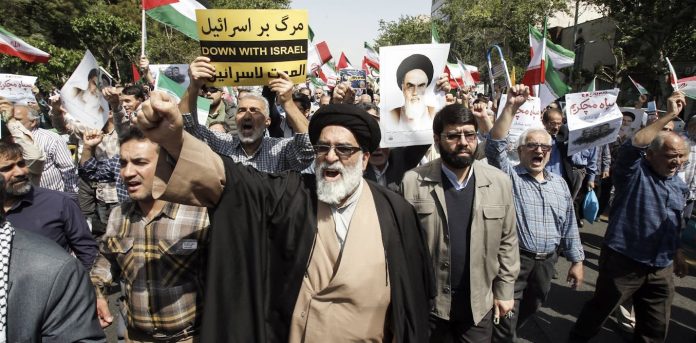Domestic politics will be a key factor in how far things escalate between Israel and Iran
The military standoff between two of the Middle East’s regional powers, Israel and Iran, risks escalating into a wider conflict that could plunge the entire region into a complete state of chaos. Following Iran’s barrage of drone and missile attacks on April 13, Israel has retaliated and conducted a strike attack near the city of Isfahan in southern Iran.
Both sides have now matched each other in striking targets within each other’s national border. But the contrast in the two countries conventional capabilities is now becoming apparent.
While Iran’s attack, involving more than 300 projectiles were mostly mitigated by Israeli missile defence systems, this relatively limited Israeli strike seems to have actually penetrated Iran’s air defences. However, details of the extent of any damage done by Israel’s strike are disputed and are being played down by Iran.
It is reasonable to assume that both states are now evaluating each other’s resilience. But the question of whether this could spiral into a full-blown war is still unclear. Iran has said it has no immediate plans for retaliation.
Israeli strategy is undoubtedly still being discussed by the prime minister, Benjamin Netanyahu, and his war cabinet. But analysts commenting in the press have suggested that Israel could strike Iran’s nuclear facilities by using its fleet of F-35 fighter jets or deploying Jericho ballistic missiles.
Even though Iran has fortified its Natanz facility in the Isfahan province, making it difficult for Israel to destroy, that course of action now seems plausible. Isfahan is reportedly “home to the biggest nuclear research establishment in the country”.
The politics of status
Image and standing represent factors which are likely to drive this escalatory trajectory on both sides. Domestic issues can play an important role here, in how the political and military elites of both states decide to react.
Netanyahu cannot afford to stand idle, especially as he seeks to avoid probing questions into the intelligence failures that led to the horrific attack by Hamas on October 7. Despite the majority of the Israeli public being in favour of the campaign to eradicate Hamas in Gaza, he remains unpopular.
His political standing will rest – to a large extent – on his ability to be seen as the leader which will deliver security and retribution for Israel. Hence there are good reasons for him to respond military to the challenge posed by Iran.
Iran meanwhile has a reason to provoke an Israeli military response. As with all military confrontations, the prospect of being attacked can be used politically to confer domestic support – which the Iranian regime has lacked recently.
The brutal and bloody repression of protesters in Iran, in response to the killing of Mahsa Amini in 2022, has posed a serious challenge to the legitimacy of the regime headed by Supreme Leader Ayatollah Ali Khamenei.
Regime forged in war
Historically, the trauma of war has been used by the Islamic Republic to foster nationalism among the population. Following the Iran-Iraq war in the 1980s, the loss of Iranian life, which totalled in the hundreds of thousands, played a huge role in cementing “the formation and empowerment of the Islamic Republic”. Militarily contesting Israel can be perceived as a means of solidifying the regime’s position internally and enhancing the country’s image within the region.
At present, neither side has the ability to send an expeditionary force into each other’s territory. But Iran may well look to exploit its network of proxy groups in the region as a means of deterring and attacking Israel – should Israel decide to escalate even further.
This represents perhaps the greatest risk to regional stability. Israel’s lack of strategic depth, which is largely determined by its geographical size, can be exploited by the Iranians. They are able to draw on Hezbollah’s large arsenal of missiles – thought to be around 150,000 – to supplement a future attack.
Given the demands of its military campaign in Gaza, Israel is likely to struggle if forced to confront adversaries on two separate fronts. This poses a dilemma for the country’s western allies.
According to a White House official, President Joe Biden has warned Netanyahu that the US will not participate in an offensive against Iran. But if Iran’s proxy forces in Lebanon and perhaps Syria and Yemen join a concerted effort to attack the Jewish state, this will change the calculations.
Just as alliances can strengthen the west’s deterrence policy in the Middle East, they can equally become a reason for conflagration. The UK is currently “very firmly engaged in counselling de-escalation and moderation”, according to government minister Mel Stride, speaking to Sky News. But realistically there is a limited amount the UK can do to influence Israeli policy.
But as the world waits to see if there will be any further military attacks by either side, one thing is clear: the domestic politics of Iran and Israel will shape how this story unfolds in the near future.
The fact that Israel’s national security minister, Itamar Ben Gvir, dismissed Israel’s response in a derisive tweet as “Lame!” underscores the impact of domestic politics on this issue. Ben Gvir may have been savaged by much of the more moderate side of Israeli politics, but he represents a constituency that Netanyahu depends on to stay in power.
Neither side wants to lose face and that may unfortunately drive the region into further instability.![]()
Ben Soodavar, Researcher, Department of War Studies, King’s College London
This article is republished from The Conversation under a Creative Commons license. Read the original article.



